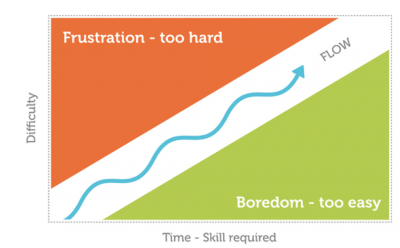FLOW. Another stressful HR trend to worry about? Not really. If reading this blog title caused you anxiety, then you could increase your skill (knowledge) about flow just enough to meet the level of challenge to apply what you know to your workplace. A little exercise within a blog.
If you are familiar with flow, skip to the conclusion or swipe/click away this blog. But if you haven’t heard or read about flow, or haven’t watched the TED talk by the guy who wrote the original book, you can learn about the concept fairly easily. It’s the challenge of applying what we learn that’s usually the trick…or the treat.
People in flow are said to be optimally creative, productive, and “time flies” when they’re having fun. They feel rewarded, energized, and yes, sometimes a bit drained from all of that focus…but flow, caused by the ideal intersection of the relevant skills to meet the appropriate level of challenge, causes growth, and increases the person’s desire to continue to grow. It’s a nice cycle.
How does this apply to your workplace? We’d be curious to hear your thoughts in comments on this blog. At Stang Decision Systems, when we’re assessing for skill gaps for our clients, we uncover areas where people are under-skilled for their jobs to help the company plan for efficient training and development. If we consider this through the lens of the flow diagram, we see that these employees are likely experiencing anxiety and are not in their optimal flow zone, where creativity and productivity are at their highest. Would the training investment, if appropriately scaled, pay off more than you imagine?
We hear more and more about how younger generations are asking for training and mentoring in the workplace, often ranking that higher than other benefits companies are investing in for their workers. Could it be that these employees know what it feels like to have the appropriate skill level/support to meet the appropriate levels of challenge in their daily activities, and they are eager to continue to grow? When thinking about retention, how do we feel about the fact that many employees leave their jobs for new workplaces where they receive more training, and, we might suggest, they feel more “in flow?”
In future posts, we’ll discuss how flow affects workplaces, including the research on the flow of successful events, teams, and organizations as a whole. We’ll also address questions left in the comments section and share your successful applications of flow in the workplace.








Leave A Comment